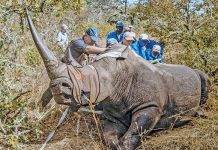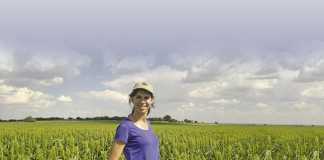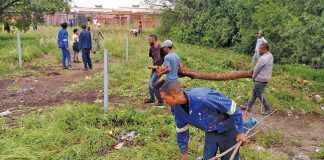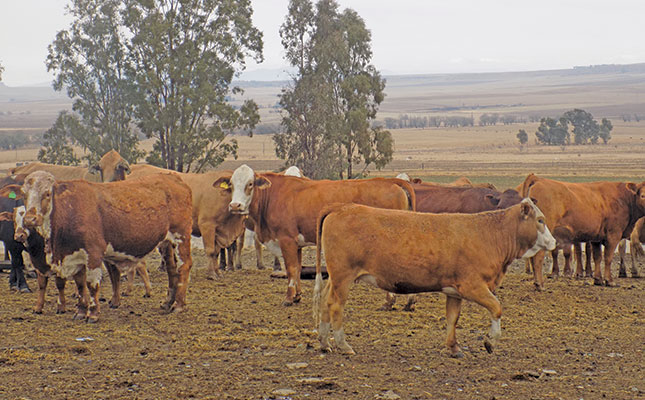
Photo: Annelie Coleman
Richard Mashinini is a businessman through and through. He believes in adding value to every part of his farming concern. For him, this is particularly important as he farms on 460ha of leased land.
Mashinini runs a mixed farming concern in the Kaallaagte area between Bethlehem and Lindley in the Free State, where he produces maize, dry beans and sunflower. In addition, his business includes a beef cattle and sheep concern, and he produces chickens. He also tenders for potato producers in the area, and facilitates the creation of thousands of jobs every year.
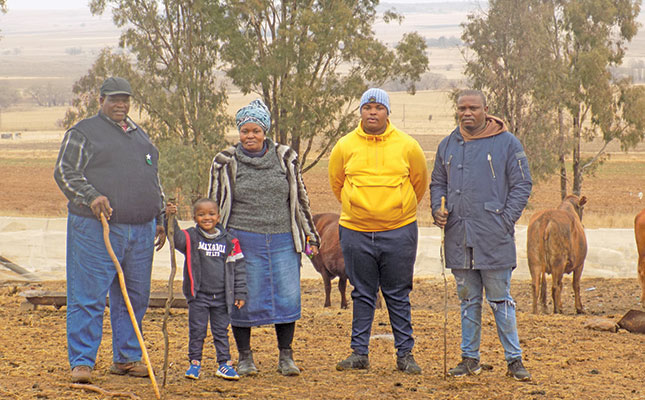
“Farming is an exacting business that calls for innovation and thinking outside the box, especially for a producer on leased land. Although I would have preferred to own the land I farm on, I don’t consider the fact that I farm on leased land an excuse not to make the best of the opportunities the agriculture sector affords me,” he says.
Top genetics
Mashinini started farming in 2012 with 12 head of cattle, and now owns a commercial herd of 100 Simbra-type cattle. In order to expand the herd’s genetic base, he recently introduced a grey Brahman bull acquired from Brandwater Stud, a well-known eastern Free State Brahman breeder.
According to him, he wanted to add Brahman genetics for the breed’s accelerated growth, adaptability and hardiness.
Mashinini’s weaners are highly sought after, and he recently realised a price of R9 700 for a seven-month-old weaner weighing 280kg.
“It obviously makes economic sense to market heavy weaners, and that’s why I prefer crossbreeding. My Simbra bull adds hybrid vigour and top milk production, amongst other things. The extended Simbra gene pool in South Africa makes it easier for commercial breeders to find bulls that are specifically suited to our farming conditions. My Simbra bull came from Simbra stud breeder Llewellyn Angus of Arlington. Brahman-Simbra crossbreeding is a win-win situation, in my opinion; good genetics make for good profits,” he explains.
Feedlotting and recruitment
Mashinini’s SA Mutton Merino (SAMM) flock consists of 400 ewes and seven rams. He uses only stud rams, and he bought his latest ram from stud breeder Gerhardus Hartman of Kroonstad. He prefers stud rams because of their genetic value.
Mashinini also runs a sheep feedlot, which can accommodate 200 sheep. Weaners in the feedlot are kept on a high-protein ration for 10 to 12 weeks before they’re put up for sale. He believes that feedlotting makes sound financial sense, as it increases the income from the sheep flock considerably, especially at the current high lamb and mutton prices.
Eighty hectares are planted to sunflower, 50ha to dry beans and 150ha to maize. The Free State’s potato production industry has also created an additional income stream for Mashinini’s business.
Since 2015, he has served as manager for the tender to source packhouse workers for various producers; he contracts about 7 000 workers every year for the potato, bean, apple and maize industries for up to six months of the year. His packhouse teams mainly work in the Lindley, Paul Roux, Senekal, Bethlehem, Reitz and Harrismith districts.
“I recruit teams from our local area, QwaQwa and even the Eastern Cape. It saves producers the trouble of finding workers and creates more income for my business. This business benefits some 15 000 people all and all, if the workers’ dependants are included in the equation,” he says.
Mashinini studied agriculture at what was then the Boskop Agricultural Training Facility near Potchefstroom in 1984. He also completed a number of courses at the Potchefstroom Agricultural College. According to him, his education played an integral role in his development and prosperity as a commercial farmer.
He is a member of the Kaallaagte Study Group, which he describes as an invaluable source of information that’s also played a part in his success.
Mashinini says that the knowledge he has gained from farmers’ days organised by the study group, for example, has gone a long way to help him make informed decisions on financial issues, animal husbandry and animal nutrition, amongst others.
He praises Hannetjie Human, a Lindley farmer and member of the study group, for her input and hard work in support of the group’s members through the dissemination of knowledge and information. According to him, Human goes out of her way to recruit a wide array of experts to tutor the group’s members. “She is a prime example of the vital role commercial farmers could and should play in terms of the transformation of agriculture in South Africa.”
Human in turn describes Mashinini as a committed and hard-working producer.
“The fact that he doesn’t own his own land has not held him back. Through determination, hard work, careful planning and the application of sound business principles, he has established himself as a fully fledged commercial farmer. With more farmers like him, I foresee a bright future for agriculture,” she says.
Land reform failure
Mashinini feels strongly about the ineffective way the process of land reform is being managed. He says that farming on leased land, despite his many efforts to obtain state support to buy land, creates immense uncertainty.
As a father of three boys, he would like to give them the opportunity to carry on with the family business, but not being able to purchase the land and obtain title deeds makes this difficult.
“One never knows when your lease could be retracted. In the Kaallaagte area there are a number of farms on the market at the moment. For example, three of my neighbours’ lands are currently for sale. All my many applications to the relevant departments in the Free State to buy land have come to naught. My wish is that President Cyril Ramaphosa will read this article and send a task team to sort out the land reform chaos in our province,” says Mashinini.
Email Richard Mashinini at [email protected].





